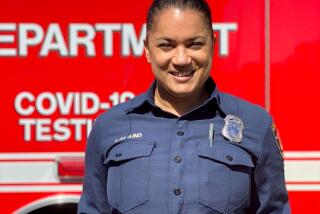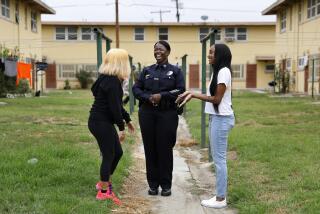FBI Post Heightens Her Profile : Leadership: Kathleen McChesney is used to being watched as a female pioneer in law enforcement. Now, as head of the bureau’s L.A. office, she is the agency’s highest-ranking female field agent.
- Share via
Kathleen McChesney is used to being watched.
She was the first woman police officer to go on patrol in the state of Washington, and camera crews from local TV stations followed her around for days in 1971. “When you’re first at something you expect to be looked at,” she reasoned 23 years later in an office on the top floor of the federal building in West Los Angeles.
Back then people watched McChesney for the novelty of seeing a slight young woman--she had to gain seven pounds to go on patrol--in a uniform worn almost exclusively by men. Nowadays a TV crew might tail her for a different reason. Her promotion to associate special agent in charge of the bureau’s high-profile Los Angeles office has made her the FBI’s highest ranking female field agent.
In the Los Angeles bureau, the largest branch outside of Washington, D.C., McChesney coordinates all investigations of violent crime.
Only one woman outranks her in the hierarchy of the FBI, an agency that did not hire women as agents when McChesney landed her first job.
But she does not dwell on that.
“I don’t really think of myself as any different than men in this position,” said McChesney, 43. “Women aren’t in the fishbowl they used to be in 25 years ago.”
McChesney dived into that fishbowl in 1971, fresh out of the University of Washington. She decided on a career in law enforcement only after “I went through 12 majors.”
A friend with the Seattle Police Department got her interested in becoming a police officer. She would talk to him about what he did each day, and listened carefully to his accounts. “I thought it was so interesting that he’d been involved in all these people’s lives during the course of the day. . . .” she said.
She joined the King County, Wash., Police Department, working for a while at the county jail, doing clerical tasks and fingerprinting. She applied for work as a full-fledged officer, but was told she was “too small,” she recalls, adding, “it was a very non-traditional occupation for a woman.”
She appealed to the Civil Service Commission, which ruled that McChesney should be allowed on the force if she gained the requisite amount of weight. She did, and seven pounds later began seven years as a detective on the force, eventually investigating some of Ted Bundy’s killings.
McChesney joined the FBI in 1978, six years after it began hiring women as agents, and began to climb rapidly through the ranks. She spent time at the main office in Washington, D.C., coordinating interstate investigations.
In May, FBI Director Louis J. Freeh appointed her to her current post in one of the FBI’s most visible bureaus, one which has scored numerous high-profile successes in the past few years by helping to catch the nation’s most wanted serial bank robber, foiling a skinhead plot to blow up a prominent black church and working to secure convictions of police officers in the Rodney G. King beating case.
McChesney is obviously elated with her position. “I’m in my goal,” she said. “I have an excellent job in an excellent city.”
The days when she had to persuade the citizens and police officers of King County that a woman could be a valuable law enforcement officer are long gone, McChesney said. Now more people accept women in uniform and treat them with respect.
“The important thing is not whether you’re the first female,” McChesney said. “It’s that you’re not the last female, that you haven’t performed so badly they’ll paint other women with the same brush.”
More to Read
Sign up for Essential California
The most important California stories and recommendations in your inbox every morning.
You may occasionally receive promotional content from the Los Angeles Times.













